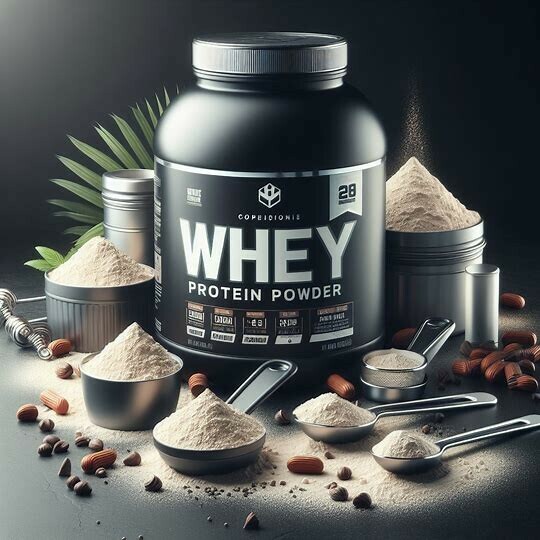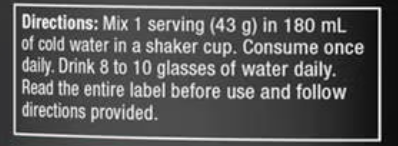4 scoops of protein powder a day is too much because you miss out on other nutrients from foods, you stop treating it like a supplement, it becomes expensive and there are health consequences associated with such a high amount of protein powder. It is important to think of protein powder as an addition to what you’re already eating. Having 4 scoops means that it is no longer an addition, but is a staple in your diet. It is better to not go above 2 scoops of protein powder. This will still help you to get a good amount of protein from this supplement, yet having a balanced diet.

Key takeaways
Below are the highlights of today
- 4 scoops of protein powder is too much for majority of people
- It’s important to treat protein powder like a supplement and not like a whole food.
- 4 scoops of protein powder results in you missing out on nutrients, it becomes expensive and increases the likelihood of health issues.
- 4 Scoops of protein powder could be appropriate if you had happened to have a low amount of protein for the day and if your protein goals are really high. However, most people’s protein goals will not be so high that 4 scoops is necessary.
- There are more benefits in having 2 scoops than 4 scoops.
- Planning your food consumption ahead of time will reduce the likelihood of 4 scoops being consumed.
Why it’s too much
As a general standard, the recommendation is not to go above 2 scoops a day. This is about 25-60g a day (although the size of the scoop will vary depending on the company). The reason this is recommended is because of the purpose of protein powder.
Protein powder is a supplement, designed to be an addition to what you’re already consuming. Protein powder is not meant to be such a large source of protein in your diet. Sure, you can have it everyday, but it’s not meant to provide 50% of your protein intake in a day.
- Missing out on the purpose
It is designed to be something to top up your protein intake, like a wild card in your diet. Essentially, choosing to have 4 scoops of protein powder a day, which is about 120g, results in you going beyond the intended purpose.

Many protein powder manufacturers, under their dosage section, recommend about 1-2 scoops anyway (3 is rare). This is their suggested recommended dosage.
Just going off that, 4 scoops a day is already going above what the manufacturers themselves are recommending. More is not always better.
At the end of the day, protein powder is a supplement, a supplement that is specifically designed to supplement protein intake for those who may be struggling to hit their protein goals. When you consume 4 scoops, it stops becoming a supplement and starts to serve the same purpose as whole foods.
Whole foods are those foods intended to provide a majority of the necessary nutrients required for your body, with supplements (such as protein powder) intended to fill in the gaps. Having so many scoops results in you treating protein powder as if it were a whole food, which is not intended.
- Missing out on nutrients
The next reason 4 scoops of protein powder a day is unnecessary is because of the nutrients. As previously mentioned, having so many scoops results in you treating protein powder as if it were a whole food. Sure, you may be getting more protein, but protein powder can’t replicate and provide you with the same amount of nutrients as whole foods.
For example, steak has close to the amount of protein that protein powder has, yet it also provides you with iron, zinc, selenium, riboflavin, niacin, vitamin B6, vitamin B12, phosphorus, pantothenate, magnesium and potassium. Not only do you get a food that provides you with a lot of protein, but you’re getting a food with a bunch of protein and vitamins and minerals.
Another example is eggs. Eggs are known for their high protein content, but they also contain Vitamin A, D, E, K, B1, B2, B5, B6, B9 and B12. That is 10 vitamins and minerals to help your body.
When you compare to whey protein. Whey has Vitamins B2, B1, B3, B5, B6, B12, Choline, Folate, Phosphorus, Zinc, Selenium, magnesium, calcium, potassium, copper, sodium and iron.
Whilst this does look like a lot of vitamins and minerals (it is), it’s necessary to remember that protein powder is a supplement that is designed to maximise the protein content (can go up to 95%). It’s purpose is to provide you with as much protein powder as possible. As a result, the other nutrients are naturally lower.
The vitamins and minerals in whey protein just listed are actually in a small amount. When you compare to eggs and steak, those two foods are great sources for the vitamins and minerals listed. There is a stark difference in the amount.
Therefore, having 4 scoops a day would result in less opportunities to have other nutrients, as you’re consuming so much protein powder
- The costly effect
Another reason 4 scoops is too much is because it becomes expensive over time. Naturally, if you’re having a lot of scoops, you’re going to finish the product much quicker than if you were having less.
For example, let’s say you’re having 1 scoop a day (which is one serving). If you buy a size that is 1kg, most manufacturers would state that there is 32-40 servings in it, meaning that 1 scoop a day would last you just over a month. However, if you switch to 4 scoops a day in the same 1kg size, that would mean that it would last you just over a week. Instead of buying a tub that is 1kg to last you a month, you would be forced to then buy 4 tubs to last you a month.
That is four times the price.
This is also for other sizes as well. Whichever the size, you’ll be finishing the tub 2-4 times faster than if you were only having around 1-2 scoops. This in turn requires you to spend more money to maintain consistency.
Protein powder can also get expensive, as depending on the manufacturer, the processessing, filtering, milling, the type of protein powder and other factors that go into creating the product all can influence the price. You could be spending $50-80 a month of protein powder, but switching to 4 scoops can easily push that to $200-$320 a month.
- Health consequences
There are health issues that can arise from having too much protein powder of a long period of time. Having too much protein powder can cause issues such as acne, nausea, thirst, bloating, constipation. This is because of the artificial sweeteners, thickeners, gums, vegetables, vegetable fats and artificial preservatives.
Additionally, the lower quality protein powders on the market may have more of these ingredients that can cause issues over a long period of time. Having 4 scoops of protein powder a day would increase the likelihood of these issues happening.
When 4 scoops may be appropriate

- Low on protein for the day
4 scoops of protein powder in a day may be appropriate if you’ve struggled to hit your protein goals for the day. It’s possible that you may have been busy all day or simply forgot to eat your protein throughout the day. People have busy work schedules and it’s not impossible for this to happen.
In this situation, you may be tired or simply do not have the time to cook a meal with the amount of protein that is equivalent to three meals worth. Having 4 scoops of protein powder with milk, or in a smoothie is effortless and can easily give you over 100 grams of protein.
Is this recommended? No. Is it necessary sometimes? Yes.
This shouldn’t be a consistent thing, but at times, having 4 scoops of protein powder to catch up on what you missed out on in a day may be beneficial.
- Protein goals are really high
Some people’s protein goal may be higher than others. For example, if you are a 6”4 110 active kg man, you would need around 180 grams of protein for optimal growth. This may be high for a lot of people and may be a struggle to consistently consume in a day. In situations like these, getting all your protein from whole foods could be a struggle and having such an amount would be alright.
However, I would like to emphasise that not everyone’s protein goals are going to be that high. There aren’t that many people in the world who actually need around 180 grams of protein.
Don’t be so quick to think you need 4 scoops. Calculate your protein intake (0.8-1 per gram per pound of body weight and/or 1.7-1.8 times your kg weight) and identify if you really need 4 scoops. Not many people’s protein goals are so high that you need 180 grams of protein. If you want to eat such a high amount, that is fine, but if you want to eat just enough, then majority of people will not need 4 scoops.
Benefits of not going above 2 scoops
- Treating it like a supplement
By having a maximum of two scoops, you’re staying within the intended purpose of protein powder, which is a supplement. 2 scoops isn’t too much and is enough to ensure that it can effectively supplement your protein intake. As mentioned previously, most manufacturers outline that their protein powder is a supplement designed to be an addition to a balanced. Having two scoops achieves this.
- Opportunities for other nutrients
Two scoops of protein powder (as a max) ensures your able to get enough nutrients from other sources. No more than two scoops means that protein powder does not take up so much of your meals/diet space, yet still gives you a good amount of protein. Maybe you could have a protein shake with two scoops, or maybe one shake with one scoop in the morning and at night, however this is enough to be a top off to what you’re already eating.
You’ll still be able to have your eggs, steaks, fruits, vegetables and other nutritional foods. You won’t be deprived of any necessary vitamins and minerals.
- Cheaper
Your wallet will thank you since not going above two scoops means that you wouldn’t be going through your tub so quickly. For example, that 1kg tub that would last a little bit over a week (by having 4 scoops) would now last you just over a month. That is a massive difference and helps you more financially.
- Lowered chance for health consequences
Finally, having no more than 2 scoops significantly lowers the chances for you to experience the issues from excessive artificial sweeteners, thickeners, gums, vegetables oils, vegetable fats and artificial preservatives. This is because your usages is lowered drastically from 4 scoops. You’re in a much healthier range and would feel better overall.
How to avoid excessive intake
- Planning your meals and finding quick protein-filled meals
To avoid excessive intake of protein powder, we have to shift our focus to our meals. A good way to do this is to meal prep for the week. Whether it be breakfast, lunch, snacks, dinners or all of them. Meal prepping your meals for the week so that they hit your macros will significantly lower your reliance on so many scoops of protein powder.
It will help you to not feel so stressed about what you should eat at each and every meal, reducing the likelihood of you choosing to have so many scoops of protein powder.
- Buy 1kg at a time
Buying 1kg a time will reduce your desire to have 4 scoops a day. This is because it will run out much quicker than a larger size and you’ll be more encouraged to pace yourself as you go through the product. It is more of a mental tip.
- Identify your protein goal
Identifying your protein goals will help you to allocate how much protein should be in each and every meal. If you are unaware of your protein goals, you run the risk of thinking “I must be low on protein for the day, let’s just have a bunch of scoops of protein powder”.
Sure, through experience you likely will be able to intuitively know how much you’ve eaten for the day and will be able to gauge how much is left, but if you’re not at this stage, downloading a food tracker and knowing your protein goals will help you greatly.
- Consult a dietician
Ultimately if you are still concerned about all the things listed and described, consulting a dietician and doctor would be the best decision.

